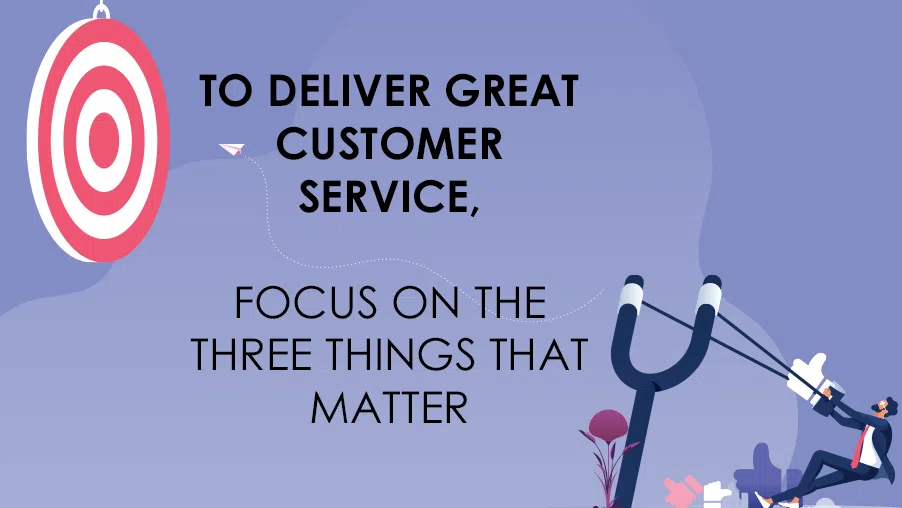To Deliver Great Customer Service, Focus on the 3 Things That Matter
- Peak Support

To Deliver Great Customer Service, Focus on the 3 Things That Matter
For growing companies, delivering excellent customer service should be a top priority. Seven out of 10 U.S. consumers say that they spent more money to do business with a company that offers great service, according to a recent study.
The good news is that delivering great service is not rocket science. The challenge is that many companies get distracted by elements of the customer service experience that aren’t actually that important to customers. This is particularly challenging for young, growing companies, where the CEO or founder is used to having direct contact with customers and may have difficulty giving up control.
Your firm can offer great service if you get your game right. To do that, focus on three things that really matter:
Timely Responses
When an email comes in, or the phone rings, someone needs to be there. This may seem obvious but you may be surprised at how often companies fall short. In a survey of more than 3,000 consumers, 42% said they were on hold for “too long on the phone,” and more than a quarter said they got no response to their email or contact request.
This is unacceptable and unsustainable, especially at a time when customers are getting more impatient. The benchmark for “timely” varies by the channel of communication. But generally, you want to answer phone calls within 20-30 seconds; respond to chats in under a minute; and respond to emails in 24 hours at the most. An email response time of under 12 hours will please your customers and under 4 hours will probably delight them.
Getting this right is a game of efficient staffing, scheduling and shift management. This doesn’t necessarily mean you need to go for 24/7 customer service – customers generally understand that response times may be longer if they reach out on evenings or weekends.
But you can often reap huge benefits just by adding a few evening hours on weekdays and/or by staffing a daytime weekend shift. An added benefit? A weekend shift reduces the Monday morning backlog, thus reducing your response times on Monday and throughout the week.
To truly optimize your schedule, you’ll need a queueing model. A queuing model will provide you with an optimal schedule based on your desired response time, your ticket volume, and other constraints. But if you have a small team, it may not be necessary.
Accurate Responses
Getting an answer quickly means nothing if the information provided is not correct, or if it doesn’t resolve the customer’s problems. “Getting a satisfactory answer is a very important part of servicing satisfaction,” according to 81% of respondents to a recent customer service survey by American Express. Customers also demand “a knowledgeable professional,” according to the survey.
With plenty of information now available online, individuals often turn to customer support staff for complex queries that they can’t resolve on their own. Your agents may be getting questions they’ve never heard before. They can’t just respond by using “macros,” or pre-written templates. They need to be well-trained, deeply committed and have ready access to up-to-date information about the company’s products, services and policies.
To achieve this, is a people and communications coordination game. It’s about training. It’s about recruiting agents who can think quickly on their feet and tackle complex situations. It’s about having the right reference materials for your agents. It’s about ensuring that you have a culture where agents are comfortable asking questions if they don’t know the answers.
Human Responses
It sounds like an existential question: what does it mean to be human? But, really, what does it mean?
It requires that your customer support representatives take initiative, have a positive attitude, pay attention to clients and show that they care. Customers appreciate it when service agents connect with them as a person, treat them with dignity, and are empathetic to their problems.
This was borne out by an analysis of hundreds of responses to customer satisfaction surveys for one of our clients, Public Rec, a men’s apparel company. Public Rec frequently gets a 100% score on its weekly customer satisfaction score; meaning each client who responds to the survey was fully satisfied.
In their reviews, customers pinpointed what made the service special. The service agent “made me feel like I mattered,” wrote one customer. Another reviewer liked that the agent was “prompt and attentive with her help, as well as pleasant.” One customer appreciated an agent who followed-up and “made it her mission to find me a pair of pants.”
In short, agents’ quick responses, pleasant attitude, and initiative, has earned Public Rec a lot of good credit with clients.
Your company too can excel in delivering customer service, if you use these principles as your foundational blocks.
This article was first published in Forbes.
Illustration by Rhea Avanceña
